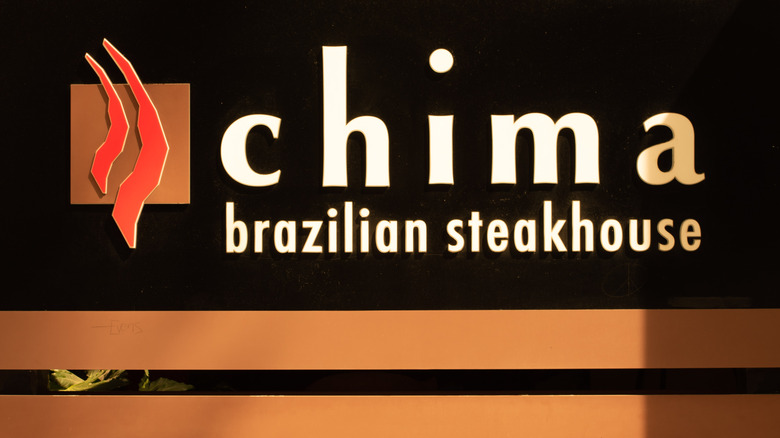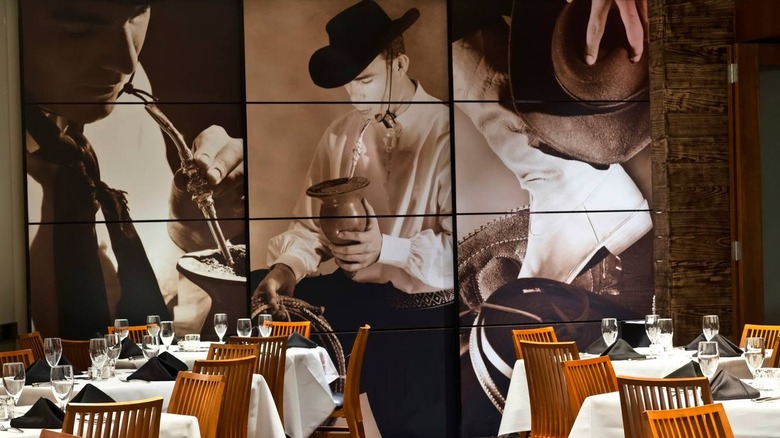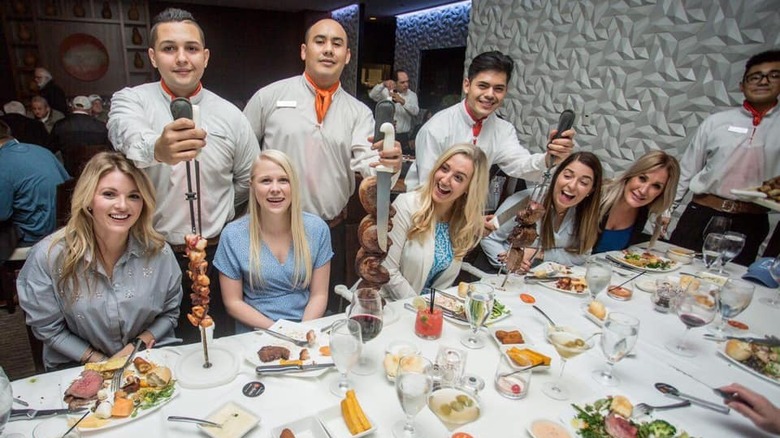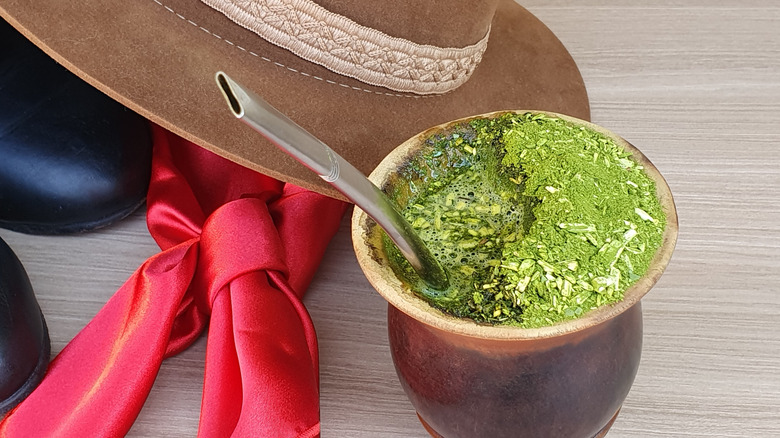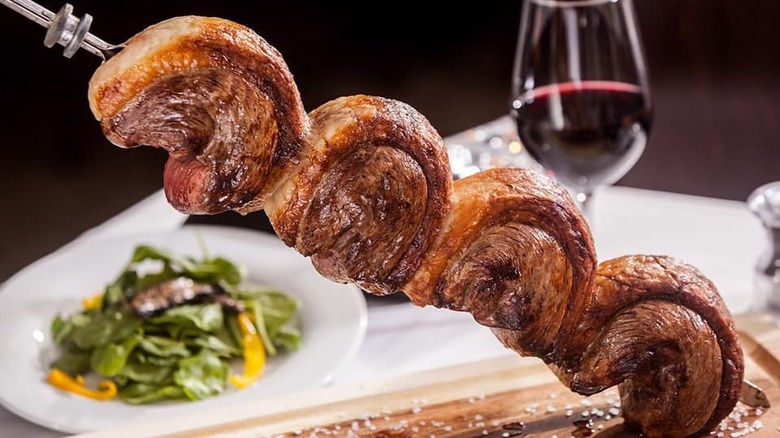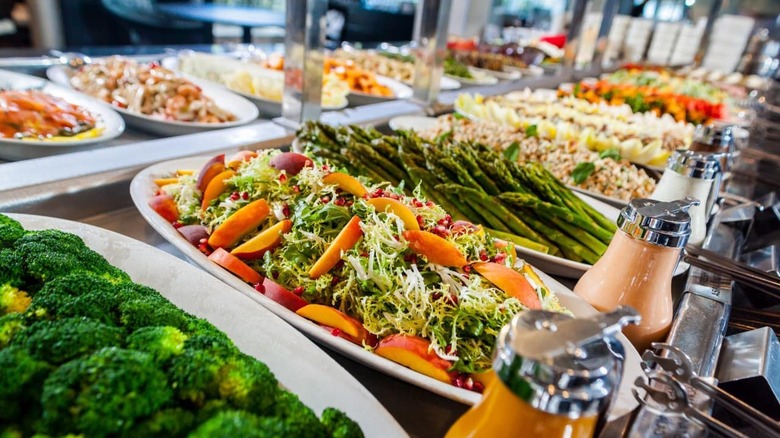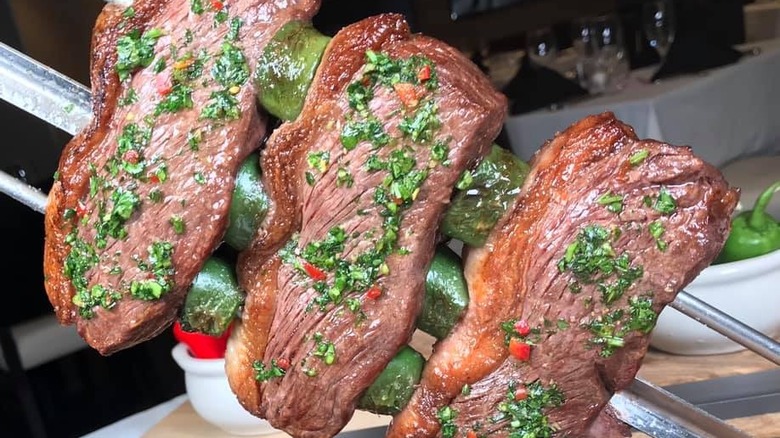The Untold Truth Of Chima Brazilian Steakhouse
A visit to a Brazilian churrascaria, or steakhouse, is best planned in advance. Those in the know recommend arriving on an empty stomach and in loose-fitting clothing. Known for excess, Brazilian steakhouses usually feature all-you-can-eat fare served by a parade of friendly waiters brandishing massive skewers of grilled meats. Chima Brazilian Steakhouse is no exception. Opening in the U.S a little under 2 decades ago, the chain — or rather mini-chain, as it only has 4 locations — is known for its exceptional service and hefty quantities of food.
There's little doubt that Chima Steakhouse is a meat-lovers dream. The chain specializes in different takes on beef, chicken, pork, and lamb. It also has a huge salad bar with an assortment of American and Brazilian sides and dishes that could easily constitute a full meal in themselves. Chima is about more than just food, however. According to its founder, Bruno Silva, the restaurant is also about sharing Brazil's rich culture. "Chima is more than just a restaurant, it's a passion," says Silva (via Star Chefs). "The Brazilian culture is intoxicating and vibrant. I wanted to share this excitement with everybody and the best way to do this was to create an authentic Brazilian steakhouse." Read on to find out more about this Brazilian extravaganza.
Chima Steakhouse originated in Brazil
Funded by the Silva family in Uberlandia in southern Brazil, the first U.S. Chima Steakhouse outlet opened in Fort Lauderdale, Fla., in 2003. Since then, 3 other Chima Steakhouses have opened across the country. Known for its friendly service and stylish settings, the chain specializes in Brazilian rodízio ("rotation" in Portuguese) service where an assortment of dishes — usually churrasco or Brazilian barbecue — are delivered directly to the tables on oversized skewers. The meat is then sliced directly onto the plates (via Our Everyday Life).
Aside from the Fort Lauderdale location, Chima Steakhouse can also be found in Charlotte, N.C., Philadelphia, and Tysons Corner, Va. Another Chima Steakhouse is set to open in Orlando, although an opening date is yet to be determined. Thus far, all we know is that the chain has put in a plan to expand a space that was previously home to the seafood restaurant, Bonefish Grill (via What Now Orlando).
Meats are served by roaming gauchos
When Bruno Silva first opened Chima Steakhouse, he wanted to offer diners more than just food — he wanted to give them an experience of Brazil's gastronomic culture. Building on tradition, Chima's food is served rodízio style by waiters dressed as gauchos (or Brazilian cowboys) known for their hospitable nature and ability to eat copious amounts of beef. In fact, gauchos spit-roasted their meat over fire in the 1800s — the same way Brazilian steakhouses prepare their meat today — before sharing it among family and friends (via Insider).
Today, the gaucho style of dining is a huge part of Brazil's — and Chima's — culinary experience. Sporting white or black shirts and orange neckties (typically worn by gauchos), Chima's waitstaff do the rounds of the dining room, offering diners numerous opportunities to sample over 15 different churrasco or Brazilian barbecue dishes. When Chima's guests are ready for a gaucho to approach their table, they flip a special disc from black to orange and request how they want their meat prepared (medium, well-done, etc.). The gaucho then slices the piping hot meat right off the skewer. Once the guests have enough meat on their plates, they flip the disc back to black (via The Gleaner).
The steakhouse is named after a traditional Brazilian drink
While the undisputed star of the Chima Steakhouse cocktail menu is the Caipirinha, a Brazilian favorite infused with cachaça — a spirit made from fermented sugarcane (per Eater) — the chain is named after an entirely different kind of beverage. Hailing from Brazil's Rio Grande do Sul, chimarrão is a caffeinated drink made from the leaves and stems of the ilex paraguariensis plant — also sometimes called yerba mate. The intensely green — almost fluorescent — drink features a creamy texture and an earthy, grassy flavor (via Amigo Foods).
Since in Brazil chimarrão is often drunk as a part of social rituals, its incorporation in Chima's name represents the steakhouse's culture of camaraderie and hospitality. Historically, the beverage was used as a means of building bonds between family and friends who gathered in a circle while the host prepared and drank the first serving, or cuia, with a straw called bomba or bombilla. The drink would then be refilled and passed to each person at the gathering (via The Tao of Tea).
Corporate Chef Adelaide Engler is a bit of a genius
The breadth of Chima's Corporate Chef Adelaide Engler's experience is truly incredible. In fact, it seems like there's very little she hasn't done. The multi-talented Brazilian chef, who joined Chima in 2020, is also a food journalist, author, culinary critic, and radio and television host. Engler has hosted the "Brazil Sensational" TV Series for Discovery World and a number of cooking shows for FOX International. Plus, she's the author of "Guia Gourmet de Nova York" ("The New York Gourmet Guide") and "O Gourmet Na Cozinha" ("Gourmet Kitchen").
Before becoming enamored with gastronomy, Engler studied economics in Brazil and worked as an investment advisor in New York City. Fluent in 6 languages, she has trained and worked at some of the world's top restaurants including Cipriani Copacabana Palace in Brazil, Institut Paul Bocuse and Restaurant Arpége in France, and El Celler de Can Roca in Spain (via Chima Steakhouse).
Chima Brazilian Steakhouse's selection of rotisserie meats and sides is huge
Nobody leaves a Chima Steakhouse hungry — in fact, it's typically quite the opposite. Many a patron has commented on the overwhelming array of the restaurant's offerings, most of them all-you-can-eat. Chima's signature cut is the certified Angus picanha top sirloin, which is served plain, with garlic, or with chimichurri and grilled jalapeño peppers. Some of the steakhouse's other meaty offerings include filet mignon, Cajun ribeye, New York steak, flank steak, and beef ribs. While Chima's specialty is beef, it also offers sausages, aji chicken, as well as New Zealand lamb (via Chima Steakhouse).
Chima Steakhouse's rodízio also consists of less meaty delights such as mixed veggie skewers and salmon with pesto or passionfruit sauce. Replete with colors and textures, the restaurant's oversized salad bar also delivers a huge range of hot and cold items. There are soups, salads, cold cuts, and cheeses. There's even farofa, a traditional Brazilian side made from yucca flour that has been compared to spicy breadcrumbs, per Creative Loafing Charlotte. Last but not least, the meal can be topped by more than a dozen dressings and homemade sauces from staples of the likes of ranch dressing and red wine vinegar to more unusual concoctions, such as Brazilian chimichurri, vinaigrette, and mint jelly (via Chima Steakhouse).
The steakhouse isn't just for carnivores
Although the main appeal of a churrascaria is meat, Chima Steakhouse also has plenty to offer vegetarians — provided they aren't put off by the meat-wielding gauchos. Vegetarian diners can simply opt for the sumptuous buffet-style gourmet salad bar without paying for the rodízio, which includes both meat and the salad buffet. According to the Chima Steakhouse website, the rodízio and salad bar will set you back $60.90. The salad bar plus 1 selection from the rodízio (there are some veg options here including the popular grilled pineapple with cinnamon, per Al Dia) costs $44.90.
With an overwhelming choice of Brazilian and American vegetarian dishes, Chima's salad bar can satisfy some serious hunger. From classic greens like Waldorf Salad, Caesar Salad, and Arugula Salad to more unusual offerings such as Black Quinoa Salad and Kale Sweet Potato Salad, the buffet offers something for all tastes. For those wishing to create their own culinary masterpieces, Chima features a variety of vegetables and sauces (via Chima Steakhouse). Furthermore, it's not just vegetarians who are impressed. Many carnivores have praised Chima's salad bar for its extensive parade of offerings, albeit pointing out that one should save room for the restaurant's main attraction — the churrasco (via Christine Celine).
Chima Brazilian Steakhouse offers gluten-free options
While steakhouses lend themselves well to gluten-free diets since they serve a lot of meat, Chima takes particular care when it comes to highlighting its gluten-free options — and it has many! So many, in fact, that the restaurant has a special gluten-free menu. From appetizers such as cheese bread and turkey spread to dozens of items from the salad bar, Chima delivers an overwhelming range of gluten-free fare. To top things off, there are also gluten-free dressings, sauces, and desserts.
Chima's extremely transparent menu, which also highlights items that contain dairy and nuts, has received overwhelmingly positive reviews from diners. One reviewer on Find Me Gluten Free wrote, "We made an online reservation and put a note that I cannot eat gluten. Upon arriving, they asked if we'd like a printout of the allergy information so I was aware of the items on the salad bar that are gluten-free." Another reviewer on the same website pointed out that Chima's server actually took the time to walk them around the salad bar to highlight the restaurant's gluten-free dishes.
Chima Brazilian Steakhouse once served drinks created by one of Philadelphia's top bars
Back in 2017, Chima partnered up with the owner of one of Philadelphia's most popular bars, the Hop Sing Laundromat, to bring its guests 3 delicious cocktails. Since the stylish speakeasy is known for its strict door policy, many rejoiced at the opportunity to sample its meticulously-crafted cocktails without having to dress to the nines. The mastermind behind the venue's delicious cocktails is its owner Lê who has been quick to highlight his appreciation for Chima Steakhouse's meaty offerings (via Billy Penn).
The main component of the 3 cocktails was cachaça, the national tipple of Brazil made from fermented sugar cane. The appropriately-named Gaúcho blended cachaça, lemon juice, crushed blackberries, soda, and simple syrup. The Gaúcha contained the same ingredients but replaced crushed blackberries with raspberries. Slightly more complex, the third cocktail called Rio-Cha was made with cachaça, oolong tea, and fresh muddled mint.
